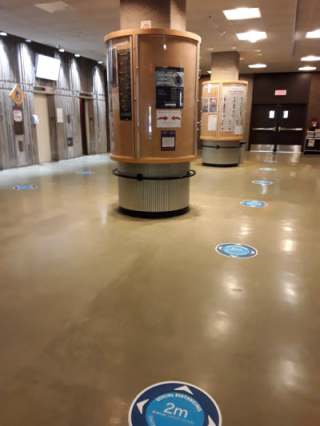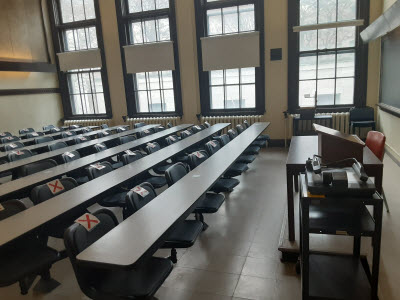The months that followed the lockdown were among the busiest for many FMAS teams involved in the pandemic response. As buildings gradually reopened for research starting in May 2020 and the University started to prepare for the Fall term and the resumption of some in-person classes, a lot needed to be done.
Signage alone required the participation of several teams. It included two-meter distancing decals for the floors, maximum occupancy stickers for elevators, washrooms and other spaces, one-way directional signage for staircases, signs directing building users to designated entrances and exits, not to mention reminders about hand-washing and coughing etiquette.
Design Services and Printing Services produced the signs, Fire Prevention and Security Services provided expertise to help designate points of entry and of exit and circulation routes, and Buildings and Grounds, Building Operations downtown and Macdonald Operations all took part in installing the signs.
 The teams worked all summer so as to cover all the buildings in time for the fall term, recalls Nakita Darveau, Supervisor, Events Support, who supported these activities until on-campus events resumed in early 2022. Work that often had to be redone as public health directives changed. “We had to redo some signs, add some, remove some,” Darveau says. "It was difficult because we felt like the directives changed a lot, but we have to understand what we were going through: this was the unknown.”
The teams worked all summer so as to cover all the buildings in time for the fall term, recalls Nakita Darveau, Supervisor, Events Support, who supported these activities until on-campus events resumed in early 2022. Work that often had to be redone as public health directives changed. “We had to redo some signs, add some, remove some,” Darveau says. "It was difficult because we felt like the directives changed a lot, but we have to understand what we were going through: this was the unknown.”
Other Events Support staff were redeployed to the new delivery hubs that were set up in a few locations on the downtown campus to centralize deliveries. Among other deliveries, they were receiving all orders of personal protective equipment (PPE), such as masks, gloves and disinfectants, and delivering them to the labs.
 Meanwhile, Design Services had to assess each classroom at McGill to calculate maximum capacities for three possible distancing scenarios: 2 meters, 1.5 meters and 1 meter.
Meanwhile, Design Services had to assess each classroom at McGill to calculate maximum capacities for three possible distancing scenarios: 2 meters, 1.5 meters and 1 meter.
“To support the resumption of in-person classes and exams, we looked at between 900 and 1,200 classrooms to determine how many people could fit in each classroom, so that central booking [at Enrolment Services] could determine which classrooms could be used,” explains Cyril Cavalier, Design Manager, Design Services.
Next page (Part 4): Health and safety first
Previous page (Part 2): Facing the unexpected